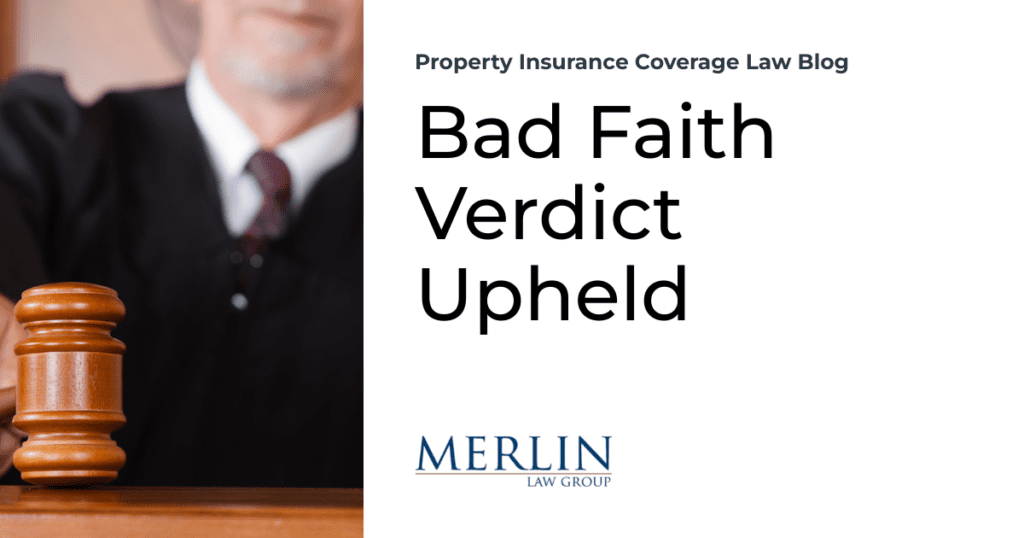Bad Faith Verdict Upheld

A federal judge upheld a jury verdict yesterday1 in a case I reported on in Merlin Law Group Wins Bad Faith Jury Verdict. The court noted in part:
As Ash Meadows points out, it presented evidence that, despite the disagreements over the cost of repairs to the property, AmGUARD’s employees failed to review more than one report, including that performed by its own independent adjuster, as well as a report going to the feasibility of perform spot repairs on the roofs, as opposed to total replacements. AmGUARD’s claim director also testified that she could not remember having reviewed the report from the engineering firm hired by AmGUARD itself. Furthermore, the engineer who examined the property for that company testified that he omitted certain costs from his report and that no person from AmGUARD ever spoke with him about his report and conclusions. From this evidence, a reasonable jury could have concluded, as this one apparently did, that AmGUARD acted with reckless disregard that its conduct was unreasonable when it evaluated Ash Meadow’s claim in this manner. Based on testimony regarding industry standards, a reasonable jury could conclude that AmGUARD’s employees knew that they were not adequately investigating and evaluating a valid claim….
I also thought that the eleven-month delay for the first payment was unreasonable and part of a pattern that AmGuard has shown across the country, as noted in AmGuard Guilty of Bad Faith—Do Not Ghost The Claimant! and Claim Delay Leads to Bad Faith Judgement. It is a problem that needs to be addressed because good faith claims adjustment calls for promptness of payment as much as it does fullness of payment. Policyholders are relying upon insurers at the critical time following a loss.
In the context of bad faith insurance trials, when a policyholder wins a case, it typically signifies a judicial acknowledgment that the insurer has engaged in wrongful conduct in handling the claim. This verdict can significantly impact the insurer, both in terms of reputation and future legal implications. Let’s break this down further:
Post-Trial Motions and Appeals: After a bad faith verdict, it is common for the losing insurance company to file post-trial motions and appeals. These motions can include requests for a new trial or a reduction in the amount of damages awarded. The appeals process allows the insurer to challenge the verdict, often focusing on legal errors they believe occurred during the trial. This stage is critical as it can potentially overturn the verdict or lead to a settlement that might be more favorable to the insurer.
Impact of a Bad Faith Verdict: A verdict against an insurer for bad faith adds a formal record of wrongful conduct to the insurer’s history. This “rap sheet” can have multiple repercussions:
Reputation Damage: The insurer’s reputation among policyholders and within the industry can suffer.
Increased Scrutiny: Regulators and consumer advocacy groups may increase their oversight of the insurer.
Legal Precedent: The verdict sets a legal precedent that might influence future cases, potentially leading to more claims of wrongful claims conduct against the insurer.
Review and Reflection by Claims Management: After such a verdict, it’s crucial for the insurer’s claims management team to thoroughly review and understand the facts and legal findings of the case. This includes understanding the rationale behind the jury or judge’s decision, including the interpretation of policy terms and evaluation of the insurer’s conduct. There is a need to identify what actions or lack thereof led to the finding of bad faith, such as unreasonable delays, lack of communication, or failure to conduct a thorough investigation.
The key objective for the insurer post-verdict should be to learn from the mistakes identified and reform their practices. This includes implementing training programs for claims handlers and revising claims processing policies to ensure compliance with legal and industry standards. It also includes promoting a culture of fair and good faith claims handling within the organization rather than just advertising it. Then, claims management must establish regular audits and monitoring systems to ensure that the new standards, culture of good faith, and practices are being followed.
Restoring ‘Good Faith’ Practices: Ultimately, the goal is to restore good faith in claims handling. This means adopting practices that are fair, transparent, and in line with the legal and ethical obligations of the insurer. Doing so not only helps avoid future bad faith claims but also aids in rebuilding trust with policyholders and the wider market.
I want to congratulate the Merlin Law Group trial team, who worked so hard to achieve this result. Paralegals Agnieszka Karcz and Sherrol Hall provided the critical behind the scenes work so crucial to success. Jon Bukowski, Larry Bache, and Mike Duffy were complimented by the judge:
The attorneys who represented Ash Meadows in this case are experienced and skilled. Mr. Duffy, in particular, has ‘nearly 40 years of experience handling insurance cases,’ and, as noted above, has been discussed repeatedly in cases from this jurisdiction which, seemingly universally, refer to him as an attorney of substantial skill and experience in this area of practice. See Colo. Hospitality Servs. Inc., 154 F.Supp.3d at 1182. The other two primary attorneys representing Ash Meadows, Mr. Bache and Mr. Bukowski, each have 12 years of experience handling insurance cases.
I take great pride in being a member of a team that is deeply passionate and committed to advocating for policyholders. At Merlin Law Group, we invest heavily in behind-the-scenes training sessions, support, and resources, all aimed at becoming the best in our field. This level of preparation and dedication is crucial, enabling us to prosecute these complex cases successfully. The success of this case is not a matter of luck—it’s a result of meticulous preparation and hard work. This is especially important considering that in these types of cases, insurance companies, with their reputations at stake, often employ highly experienced and skilled trial advocates. Our commitment to excellence ensures that we meet these challenges head-on, armed with expertise and unwavering dedication to our clients’ causes.
Thought For The Day
The will to succeed is important, but what’s more important is the will to prepare.
—Bobby Knight
1 Ash Meadows Townhome Assoc. v. AmGUARD Ins. Co., No. 1:21-cv-00029 (D. Colo. Nov. 9, 2023).




